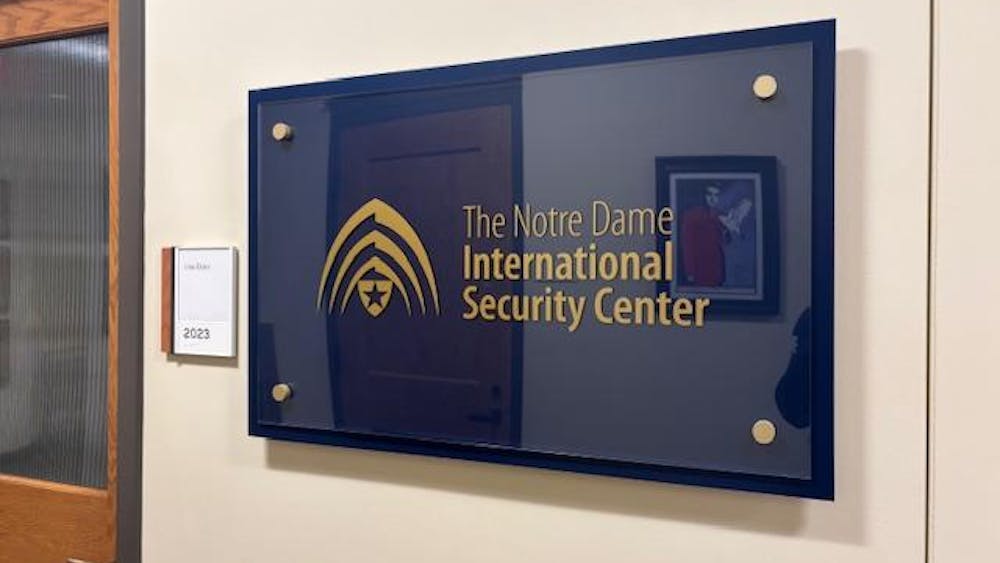Supreme Court Justice Anthony Kennedy is trying his hand at “freshman philosophy” to redefine marriage in his Supreme Court opinion on same-sex marriage rather than relying on the words of the constitution and legal precedent, Ryan Anderson said.
Ryan T. Anderson, the William E. Simon Senior Research Fellow in American Principles and Public Policy, gave a lectured titled “Truth Overruled: Marriage and the Future of Religious Freedom” in DeBartolo Hall on Monday evening. The lecture, which was sponsored by Students for Child Oriented Policy, discussed the impact of the recent ruling by the Supreme Court on same-sex marriage and its possible repercussions on marriage and the family.
Anderson said heterosexual couples that do not adhere to the institution of marriage in its full meaning have caused the problems that afflict the family today.
“The legal redefinition of marriage could only take place after the cultural redefinition of marriage,” he said. “It is only after 50 years of heterosexuals making a mess of love, and sex and the family with non-marital child bearing and high rates of divorce that Anthony Kennedy can say the male-female part doesn’t matter. … This problem with the decline of marriage rates and the increase of non-marital childbearing is a direct consequence of the sexual revolution and the values it began promulgating about the family.”
Anderson said the problem with Justice Kennedy’s ruling is it enshrines the vision of sexuality and marriage that centers on adult romance into our constitution.
“If you think the past 40 or 50 years of marriage practices in the United States has been a good thing for our children, and a good thing for families and communities, the same past 40 or 50 years where we’re seen the introduction about hook-up culture and the doubling of divorce rates, if you think that’s been a good thing for human well-being and human flourishing, then by all means cheer on Anthony Kennedy’s decision,” he said. “If you think this has been problematic in many respects for human well-being and human flourishing, then you might want to be cautious before having five unelected judges redefine what marriage is and then say our constitution requires it.”
Anderson said the overarching argument of his book, which shares a name with the lecture, is that the marriage movement should model itself after the pro-life movement.
“Just like Roe v. Wade, there is nothing in the constitution that actually says there is a constitutional right to have an abortion,” Anderson said. “So too, there is nothing in the actual constitution that requires a redefinition of marriage.”
The Fourteenth Amendment does not give an explicit definition of marriage, Anderson said, and this lack of common understanding about the institution of marriage is the true point of contention in the marriage debate.
“Everyone is in favor of marriage equality,” he said. “Everyone wants the law to treat all Americans equally. The only way that Kennedy could attempt to show the law was violating equality was to smuggle in his own vision of marriage that sees marriage about primarily consenting adult romance.”
Anderson said the Supreme Court’s ruling on same-sex marriage is degrading the status of marriage in contemporary culture.
“The law cannot teach both views of marriage, it will teach one or the other,” Anderson said. “The law will then shape our culture, our culture will then shape our beliefs, and our beliefs will shape our actions, and not just for you in the audience but for your children and your children’s children.”
The restructuring of marriage to become more compatible with modern attitudes about dating will have negative consequences for the family, he said.
“Now that Justice Kennedy has redefined marriage to make it a genderless institution, there is no institution left in public life that promotes the ideal that every child deserves both a mother and a father,” Anderson said. “What defining marriage does is say men and women are interchangeable and that mothers and fathers as replaceable.”
Anderson said it is better for children to be raised by a mixed-gender couple, and that this benefit to children is the reason for governmental involvement in marriage.
“A secondary concern of mine is the effect redefining marriage has on children,” Anderson said. “A child raised by both a mother and a father is provided with the best environment for human flourishing, and there are a few reasons why. Science supports the fact that biology matters, gender matters, and stability matters.”
Anderson said the demonization of those who have traditional views of the institution of marriage acts as an obstacle to intelligent discourse on the topic.
“If you heard people say over the course of the past decade that if you’re against same-sex marriage, then you’re no better than a racist bigot who is against interracial marriage, believe them,” he said. “Now that they are in the ascendency of cultural power, they intend on treating people who believe marriage is the union between a man and a woman as if they are racists or bigots.
“Unlike the abortion issue, too many people at the elite level on the marriage issue view people who believe marriage is the union of a man and a woman as not only wrong, but also evil. It is our challenge, as Middle America, to have a debate where reasonable people of good will can disagree but coexist.”
Read More
Trending









